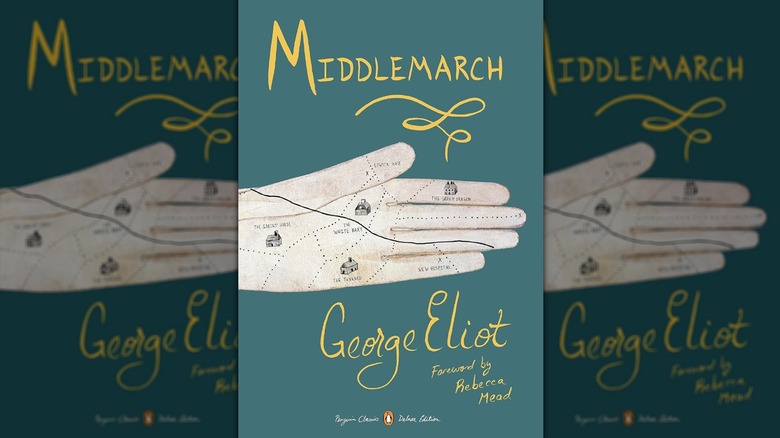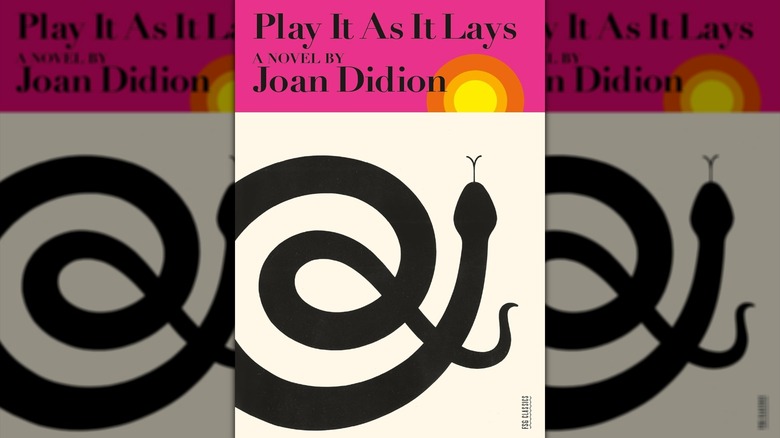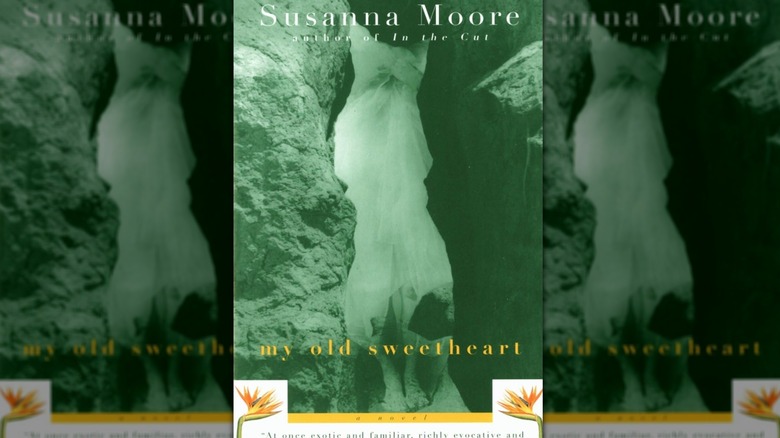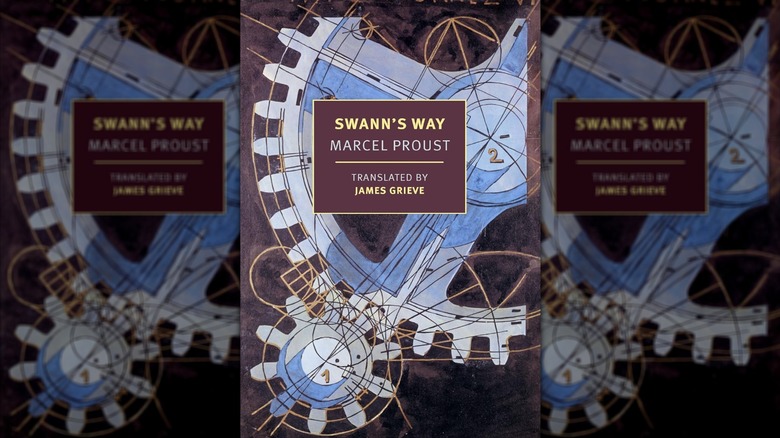Carrie Fisher's Favorite Books Were A Testament To Her Wit
Carrie Fisher was a voracious reader and the author of several books including "Wishful Drinking" and "Postcards from the Edge." The legend was known primarily as an actor, most famously for her role as Princess Leia in the original "Star Wars" films, but she was also a literary person ever since her childhood. In fact, in many interviews throughout her life before she died in 2016, Fisher spoke about reading and writing with as much energy as she spoke about performing.
In a conversation with the Los Angeles Times in 2008, Fisher talked about her early life as a reader. "I started reading really early. I wanted to impress my father [Eddie Fisher], who is unimpressable," Fisher began. "For whatever reason, he may have given me the 'Drunken Boat' by Rimbaud ... reading was my first drug. I would just go into these books and never surface until it was over. My family called me 'the bookworm,' and they didn't say it in a nice way. I fell in love with words." Fisher obviously connected with writing and reading, and throughout her life, literature served as a meaningful outlet. In 2008, she spoke to The Week about her favorite books, and why she loved them so much, and since Fisher's such a devoted reader, we had to check them out.
Carrie Fisher felt that George Eliot's 'Middlemarch' was 'one of the greatest books ever written'
Carrie Fisher told The Week that she loved George Eliot's 1871 novel "Middlemarch." Eliot, whose real name was Mary Ann Evans, went by a pseudonym because she felt that male authors were treated with more credibility than their female counterparts. But this gumption and creativity were part of the reason that Fisher loved the novel so much. "One of the greatest books ever written by a woman, especially in those early days," the "Star Wars" lead explained. "Although Mary Anne Evans gave herself a male pen name, she showed incredible ambition and scope in her writing — the world she created, the characters she imagined. I love that line in the book that reads: 'The really delightful marriage must be that where your husband was a sort of father, and could teach you Hebrew, if you wished it.' It was hard to be a woman in those days, but her storytelling was exceptional."
It's no light read, and reviewers on Goodreads noted its length, but, like Fisher, how much they loved it. "Middlemarch is a behemoth book at almost 1000 pages," one reviewer began, "but it's a book that grows with you." While the reading process is lengthy, fans felt it was worthwhile. "I conquered the biggest tome for this year. And I loved it," another wrote. It's one of the great English novels.
David Sedaris' 'Naked' was 'one of the funniest books' Fisher had ever read
Carrie Fisher was a huge fan of American author and humorist David Sedaris, particularly his 1997 collection of essays "Naked." She told The Week why she enjoyed the nonfiction book so much. "This collection of personal essays made me laugh as hard as any book I've ever read," Fisher explained. "I also discovered that I needed glasses when reading this, but still it's one of the funniest books ever."
The Goodreads community, like Fisher, raves about Sedaris's book. "David Sedaris's biting, hilarious memoir about his family and his teenage years made me laugh out loud," one reviewer began. "Not your typical, chuckle to yourself on the bus laugh, no, Sedaris made me guffaw as he recounted his [first] job working at a mall cafeteria, and when his sister first got her period." People reported unanimously that they couldn't contain their laughing fits when reading Sedaris. "Laugh out loud reading... great tales about an interesting family from one of the funniest essayists around... thank you NPR for turning me on to David Sedaris!" another reviewer wrote. Clearly, this Fisher-endorsed book is a quality read.
Joan Didion's 'Play It as It Lays' influenced Fisher's own writing style
Joan Didion's 1970 novel "Play It as It Lays" made it onto Carrie Fisher's list. While Didion was best known for her style of writing known as New Journalism, her novels are timeless. "I love her use of spare narrative throughout this story about an unfulfilled actress looking for purpose in her life," Fisher told The Week. "I admired the style then and have tried to pattern some of my own writing in that fashion."
The novel made a mark on several Goodreads fans as well, but it's no light read. "Gambling, domestic violence, sexual abuse, drugs, alcohol, promiscuity, insanity, depression, snakes, suicide," a reviewer began. "These are all elements of 'Play It As It Lays,' and much, much more. This is stark, wide-eyed, slap in the face prose that grabs the reader and holds you from beginning to end." Another reviewer spoke about the alluring challenge of the book. "This is a cruel book populated by cruel characters whose hearts, for the most part, stay cold and brutish even in the desert's blistering heat," they wrote. "I have enjoyed Didion's essays, so I was expecting some of the themes, but I had not prepared myself for something so delirious and fragmented." Despite the dark themes of the novel, many readers called it a masterpiece and admitted, like Fisher, that Didion shaped their own literary voices. Singer Lorde counted Didion among her most influential authors too.
Carrie Fisher enjoyed 'My Old Sweetheart' by Susanna Moore because of her relationship with her mother
Carrie Fisher was a fan of Susanna Moore's 1982 novel "My Old Sweetheart." The novel deals with layered family dynamics, something that seems universally appealing to readers. In fact, in Taylor Swift's top five books, she lists several books that deal with complex family relationships, proving that it's a successful theme for a gripping read. For Fisher, Moore's novel appealed to her because of the mother/daughter dynamic. "She's an extremely talented writer," Fisher told The Week. "Her first novel, set in the 1950s, is about a woman who grew up with a very eccentric mother, which, of course, is why I related to it." Fisher spoke of her own challenging relationship with her mother, Debbie Reynolds. While the two eventually became close, Fisher didn't speak to Reynolds for close to ten years.
It was the fraught familial relationship that drew Fisher to Moore's iconic book. "This book is a marvelous novel set in Hawaii about a twisted, co-dependent mother/daughter relationship," a reviewer began on Goodreads. "A young woman looks at her childhood and her mother's intoxicating beauty and suffocating need in the hopes of trying to understand the past and not duplicate the same unhealthy relationship with her own daughter." While it's a complex read, "My Old Sweetheart" drew readers in and did not disappoint.
Fisher felt that finishing Marcel Proust's 'Swann's Way' was an achievement
French author Marcel Proust wrote a seven-part novel called "In Search of Lost Time." The epic work was actually fashioned from Proust's own memories, and the publication spanned from 1913 to 1927. The first book in this collection is "Swann's Way," or "Du côté de chez Swann," as it was originally published in French. For Carrie Fisher, simply reading this enormous first book was an accomplishment. "I'm also showing off that I've actually gotten through 'Swann's Way', the first volume in Proust's monumental work 'In Search of Lost Time.' Just getting through those first 100 pages, where he could not fall asleep until his mother kissed him good night, was an achievement alone," she told The Week.
Despite the marathon-like read expected of devoted fans, reviewers on Goodreads were positive about Proust's first novel. "I know it is impossible for me to write a proper review for Proust," one person began. "I can only bow my head in front of his genius and be awed by his writing. That's because you have to be a magician of words to pull off a 600-page novel where nothing happens and the reader is glued to the page, wanting more." Another fan wrote, "My goodness, Proust could write." Clearly, Fisher isn't the only one who saw the gem of Proust's work, and enjoyed the bragging rights that came with finishing his saga.





